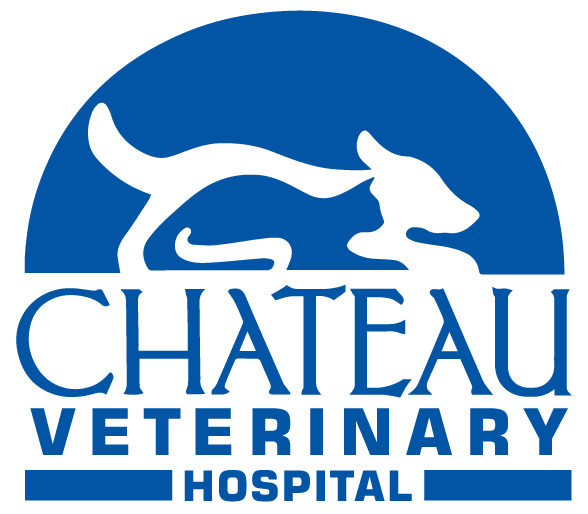Picking a Pet Food Can Be Overwhelming
Providing good nutrition is critically important to your pet’s health, but choosing the right food can be almost impossible. There are thousands of formulas of pet food available and big box pet stores of about 20,000 square feet with most of that space dedicated to pet food. Pet food is big business and marketing has become the most important component of the pet food business. One of the most popular pet food brands was started not by a nutritionist, but by a marketing whiz kid.
Chateau Veterinary Hospital’s Criteria for Pet Food:
While we cannot keep track of every food available, there are certain questions you should ask or investigate before you choose a food. The person at the pet store who is so intently trying to sell you a specific food should either be able to answer these questions or provide you with contact information so you can find out for yourself.
- Is the food manufactured in plants owned by the pet food company? This is extremely important in being able to control the quality of the food.
- Does the company employ a full-time veterinary nutritionist on staff and do they develop the food formulas? This person should have a Ph.D. in veterinary nutrition or be a veterinarian who is board-certified in nutrition.
- Does the company do their own feeding trials? That means actually feeding real pets the food and monitoring the results.
- Does the food have an AAFCO statement on the packaging? AAFCO stands for Association of American Feed Control Officials. There are two levels of AAFCO statements. You want the packaging to say that feeding trials done according to AAFCO standards were done. This statement should be on any food you purchase.
By-Products?
By-products have become the dirty word in pet food. That is not necessarily true. By-products (by good manufacturers) are the organ meats, such as liver, kidneys, etc. that your great grandmother used to cook and that we no longer want. These are usually very rich sources of nutrition.
Raw?
If you choose to feed raw, make sure your food manufacturer can answer our question list adequately. If you choose to prepare a raw diet yourself, please let us connect you with a veterinary nutritionist who can help you make sure your food is balanced. Beware that feeding raw can be a source of infection for your pet and for your family members.
Canned or Dry?
For cats, we suggest canned, as we can meet their protein needs better that way. See Cat Nutrition for more information: http://www.chateauvet.com/services/cat-nutrition
For dogs, either dry or canned is ok. Dry is easier, but canned may be tastier for elderly dogs, dogs with medical issues, or very picky eaters. Dry is not better for dog’s teeth, despite common beliefs.
The Most Important Thing!
The most important thing when feeding your pet is Good Food, Not Too Much.
Ask us!
Pet food choices and feeding habits can affect your pet’s health and happiness. This can be a very complicated subject and choices can vary depending on your individual dog or cat.
We are happy to discuss your pet’s nutrition with you.


